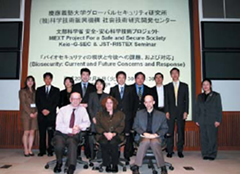The international community today confronts a variety of global security challenges, including global warming, energy issues, infectious diseases, natural disasters, population growth, starvation, food security, cyber security, terrorism, transnational crime, and proliferation of weapons. It is essential for every nation to tackle the transnational security challenges under close international cooperation. Accordingly, the role of science and technology in addressing these challenges has increased its significance profoundly.
Japan needs to contribute to making the world safer and more secured by fully taking advantage of its science and technology prowess. By transforming Japan's scientific and technological edge into its "smart power", Japan is expected to strengthen its diplomatic power and international presence.
There remain many potential areas where Japan can utilize its capability for science and technology to the maximum extent for the benefits of global security as well as Japan's own diplomacy and security.
The aim of this project was to provide a collaborative platform between science and technology community and diplomatic/security community in Japan to think through appropriate policy and a framework to ensure effective domestic/international collaboration thereby utilizing Japan's scientific and technological edge to address global security challenges.
This project had forged domestic/international networks among government officials, universities, research institutions, private sector, and NGOs, and developed a platform to share information and best practices, and to explore collaborative opportunities among the partners in many countries.
RISTEX has rich experience and expertise in promoting R&D targeted to addressing various societal problems, and in creating a platform among stakeholders to transform research outputs to policy tools for these problems. RISTEX makes the full use of these experiences, expertise, and networks for diplomacy and security, both nationally and globally.
Issues covered by the project
The project worked towards creating a platform for collaboration to discuss following issues:
- What sort of science and technology is required in order to deal with global security challenges? What sorts of domestic/international collaboration structures and measures are needed for promoting R&D and implementing the outputs?
- In order to fully utilize Japan's scientific and technological prowess, what strategies are necessary for Japanese diplomacy and national/global security?
- What sort of governance structure is needed in order to prevent the misuse of science and technology that could results in harming mankind, animals, and environment?
* Independent activities of this project ended in FY2011.
RISTEX continues to promote the R&D of science and technology for society by adding the outputs of this project.
Articles, papers, presentations
Katsuhisa Furukawa and Naoko Noro. (2010). The Nexus between illicit networks and WMD proliferation: The Case Study of North Korea. In Caroline Zimke-Dickens and Julian Droogan (Eds.) Asian Transnational Security Challenges: Emerging Trends, Regional Visions. pp.167-182. Sydney, Australia: Macquarie University.
Katsuhisa Furukawa and Naoko Noro. (2010). Illicit Networks & North Korea's WMD Program. Asian Conflicts Reports, Issue 13, pp. 4-5.
Naoko Noro, Shinsuke Tomotsugu and Katsuhisa Furukawa. (2010). The History of CBRNE incidents in Japan. Asian Conflicts Reports, Issue11, pp. 6-7.
Events
CBRN-E Asia Pacific Conference
April 11-12, 2011
Venue: Grand Copthorne Waterfront Hotel, Singapore
Hosted by SMi Grop (RISTEX as a Media Partner)
Conference Website: http://www.smi-online.co.uk/ts20.asp
Project activities
- Developing a platform for collaboration between the relevant stakeholders in Japan.
- Encouraging cooperation with overseas policymakers, research institutions and research networks, forging an international network.
- Bringing together various stakeholders such as scientists, policymakers, private sector and NGOs, and forging a multi-level network.
- Hosting events with overseas organizations and experts.
- Making policy recommendations, sharing and disseminating information, etc.

Joint seminar with Keio G-SEC on Biosecurity

Expert meeting with the FBI